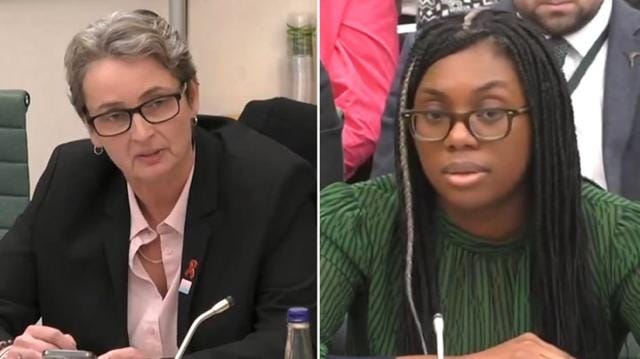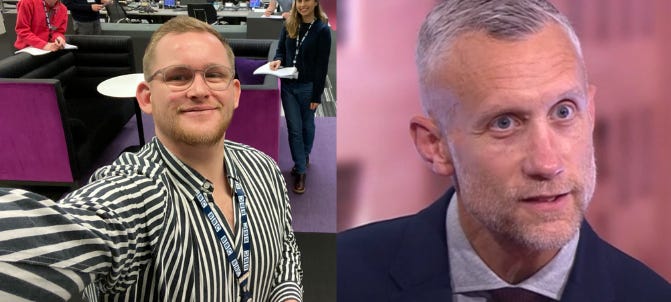How the BBC works to keep you in the dark
To our National Broadcaster, no news is good news when it comes to gender ideology. A BBC insider explains what's going on.
There's a reason the BBC consistently fails to cover stories such as Kemi Badenoch's Commons statement and her appearance before the Women and Equalities Select Committee last week. It doesn't happen despite the existence of the LGBT and Identity team; it happens because of it. The problem is the team’s existence itself.
The team is LGBT and Identity Correspondent Lauren Moss and LGBT Producer Josh Parry. They’ve been *grouped in the ‘Identity’ hub with all the Education journalists*, which in itself is a big red flag. And a couple of weeks ago, they were protected by News CEO Deborah Turness and head of UK Content Richard Burgess in cuts while key Home Affairs and other roles were dissolved.
There’s also a Global Gender and Identity Correspondent Megha Mohan who hasn’t produced anything on the growing realisation worldwide that gender affirmation is crushingly harmful to thousands of children and young people.
On gender and identity, there’s only one story in town, and they’re not doing it. And the team exists only to ensure that no one else does it either. (That’s notwithstanding their coverage this week of schools guidance - which was an inescapable responsibility.)
In a normal journalistic world, these appearances by Kemi would not only be in the diary for routine coverage, you’d be looking out for other juicy morsels accompanying it and you’d have your sources and contacts on hand for comment. Furthermore, you’d be ready to alert your health and education colleagues for anything in their fields and you’d have your background copy on standby. People get used to the BBC not covering this issue but to me it’s shocking there’s a fully resourced team that deliberately ignores it.
Parry tweeted out their story on gay veterans the Monday after, saying it came up at the weekend. Nothing should have stopped them covering what happened in the Commons on the 6th of December and there was nothing to stop them covering Kemi’s committee appearance last week.
It’s not normal. When you're working on a long-form project, there are typically two of you involved. If there are major developments, you can pause it, and your editor should step in and say, 'If you can't cover this, I'll find someone else to pick it up.
So are Lauren and Josh fully to blame? Not entirely. This is the most toxic UK story I can remember and it’s entirely because of activists who batter the BBC and the team constantly with complaints, phone calls, emails, and approaches to their internal activist contacts. Publish anything neutral and fact-based and you invite a world of pain. This is why no one else in Health, Education or Politics wants to do it and it’s where Lauren and Josh’s editors have to step up.
But there are no Ben Bradlees at the BBC when it comes to gender reporting. The shorthand of what they’re supposed to say is ‘Is it true? We’ve got your back’. But senior editors seem just as afraid of the activists as everyone else. And those who suggest a fact-based approach are dismissed as activists themselves. I was one of them but there are others.
The best thing the BBC could do to ensure better coverage (and it’s an exceptionally low bar) is to employ someone tremendously brave - who knows what a fact is - to cover this story specifically, give them the full backing of the most senior editors, and let it run.
I asked for this, a lot, when I was there. Obviously, it was turned down, along with the dozens and dozens of non-transactivist stories that I pitched, frankly, in desperation. So the next best thing, ironically, would be to get rid of these posts altogether. Put the story out to general reporters or let it be picked up by specialists in the various fields it touches like legal, health, politics and so on. Spread the load, widen the contacts books, give up on the bylines, and focus on facts.
The natural opportunity to do this came first when Ben Hunte left. The second came just now with the latest reorganisation. The fact it didn’t happen means it’s pretty clear the team is wanted there, in position, not doing the story, and providing a reason for no one else to do the story.
If you have a story for The Whistleblower, send details to thewhistleblowermailbox@gmail.com
Anonymity is guaranteed should you need it.





I was always a dedicated enthusiast for the BBC until about three years ago when I found myself on protests for the first time in decades. To me the case involving Marion Millar was a serious attack on reason as well as on her personally. A BBC reporter turned up outside the court on each occasion but her attitude was dismissive and uninterested. There was little or no TV coverage. I started to join other protests on Womens rights in Glasgow and Edinburgh and again saw the numbers understated and the coverage muted. I am now a cynic and a critic and have no faith in the BBC and all that I believed it stood for. Another casualty of the sinister movement that is gender ideology.
Bloody hell.
We knew it was bad at the BBC, just didn't realise how bad.
I'm happy to say that I no longer have a TV licence it's perfectly legal so long as you don't watch 'live' TV. Check it out.
I have Netflix & Prime and only get some programming via catch up.
As far as the 'News' went, I had already switched to C4 or ITV.
Here in Scotland, a regular on News programmes is trans identified male 'Ellie Gommersal' who rather hilariously appeared in a piece about the lack of women in politics. (seen clips posted on X). The notion of interviewing an actual woman, seems not to occur.
At these times I'm delighted NOT to be contributing to the dross.